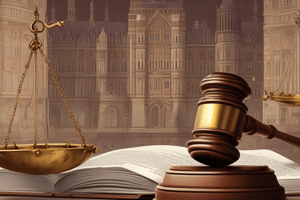Podcast
Questions and Answers
In what specific circumstance would a court most likely grant an interlocutory injunction, considering the balance of rights and potential impacts?
In what specific circumstance would a court most likely grant an interlocutory injunction, considering the balance of rights and potential impacts?
- When the applicant demonstrates a high probability of success in proving defamation at trial, thereby justifying restraint on freedom of the press. (correct)
- When the applicant is seeking monetary compensation for damages already incurred due to a breach of contract.
- When the status quo requires immediate alteration to prevent further financial losses, even if the legal rights are still uncertain.
- When the court deems it necessary to immediately halt all picketing activities, regardless of their potential lawfulness, to prevent public disruption.
Assess the implications of seeking an injunction to prevent an alleged act of defamation, considering the constitutional rights at stake.
Assess the implications of seeking an injunction to prevent an alleged act of defamation, considering the constitutional rights at stake.
- It is automatically granted if the applicant can show any level of potential harm to their reputation, regardless of the public interest in the information.
- It primarily hinges on demonstrating that the applicant has suffered irreparable financial harm that can only be remedied through injunctive relief.
- It involves a straightforward application of property law principles, where the protection of one's reputation outweighs freedom of expression.
- It inherently requires balancing the constitutional right to freedom of expression against the individual's right to protection of their reputation. (correct)
Under what precise conditions would a court be justified in issuing a mandatory injunction, taking into account the equitable nature of the remedy?
Under what precise conditions would a court be justified in issuing a mandatory injunction, taking into account the equitable nature of the remedy?
- When monetary damages are deemed an inadequate remedy, and the act to be performed is clearly defined and enforceable without causing undue hardship. (correct)
- When the public interest requires the defendant to undertake a specific action, regardless of the impact on their personal rights or obligations.
- When the defendant has repeatedly violated a contract, and the plaintiff seeks to punish the defendant through specific performance.
- When the defendant's actions have caused significant emotional distress to the plaintiff, and the only way to alleviate that distress is through mandatory action.
Analyze the critical rationale behind the requirement that damages must be an inadequate remedy before a court grants injunctive relief.
Analyze the critical rationale behind the requirement that damages must be an inadequate remedy before a court grants injunctive relief.
Critically assess the factors a court considers when balancing freedom of the press against an individual's right to reputation in defamation cases seeking injunctive relief.
Critically assess the factors a court considers when balancing freedom of the press against an individual's right to reputation in defamation cases seeking injunctive relief.
Evaluate the strategic implications of seeking an interlocutory injunction versus pursuing a full trial in cases involving ongoing trespass or breach of contract.
Evaluate the strategic implications of seeking an interlocutory injunction versus pursuing a full trial in cases involving ongoing trespass or breach of contract.
How does the availability of injunctive relief as an equitable remedy influence strategic decision-making in intellectual property disputes, such as copyright or trademark infringement?
How does the availability of injunctive relief as an equitable remedy influence strategic decision-making in intellectual property disputes, such as copyright or trademark infringement?
Assess the inherent limitations of injunctive relief in resolving complex employment disputes, particularly concerning its impact on the employment relationship and the potential for future conflict.
Assess the inherent limitations of injunctive relief in resolving complex employment disputes, particularly concerning its impact on the employment relationship and the potential for future conflict.
In the context of unlawful picketing, analyze the legal and practical challenges associated with obtaining and enforcing an injunction to restrict picketing activities.
In the context of unlawful picketing, analyze the legal and practical challenges associated with obtaining and enforcing an injunction to restrict picketing activities.
How do courts differentiate between mandatory and prohibitory injunctions, especially given the implications for enforcement and the potential burden on the enjoined party?
How do courts differentiate between mandatory and prohibitory injunctions, especially given the implications for enforcement and the potential burden on the enjoined party?
Assess the overarching role of equity in shaping the availability and application of injunctive relief, considering its historical development and modern-day relevance.
Assess the overarching role of equity in shaping the availability and application of injunctive relief, considering its historical development and modern-day relevance.
How does the standard of proof required for obtaining an interlocutory injunction differ from that required for a permanent injunction, and what justifies this difference?
How does the standard of proof required for obtaining an interlocutory injunction differ from that required for a permanent injunction, and what justifies this difference?
Examine the implications of seeking an injunction to prevent breaches of contract, particularly in the context of commercial agreements involving highly specialized or unique services.
Examine the implications of seeking an injunction to prevent breaches of contract, particularly in the context of commercial agreements involving highly specialized or unique services.
What specific challenges arise when seeking injunctive relief against a defendant who is acting under the direction or control of a foreign government or entity?
What specific challenges arise when seeking injunctive relief against a defendant who is acting under the direction or control of a foreign government or entity?
Analyze the potential conflicts that may arise between injunctive relief and other legal or equitable remedies, such as specific performance or declaratory judgments.
Analyze the potential conflicts that may arise between injunctive relief and other legal or equitable remedies, such as specific performance or declaratory judgments.
How can the principles of proportionality and reasonableness influence a court's decision to grant or deny injunctive relief, particularly in cases involving complex or far-reaching consequences?
How can the principles of proportionality and reasonableness influence a court's decision to grant or deny injunctive relief, particularly in cases involving complex or far-reaching consequences?
In what ways does the availability of injunctive relief impact the negotiation and settlement of disputes, both before and after litigation has commenced?
In what ways does the availability of injunctive relief impact the negotiation and settlement of disputes, both before and after litigation has commenced?
What are the principal mechanisms a court employs to ensure compliance with an injunctive order, and what are the potential consequences of non-compliance?
What are the principal mechanisms a court employs to ensure compliance with an injunctive order, and what are the potential consequences of non-compliance?
Analyze the ethical obligations of legal counsel when advising a client regarding the pursuit or defense of injunctive relief, considering the potential impact on all parties involved.
Analyze the ethical obligations of legal counsel when advising a client regarding the pursuit or defense of injunctive relief, considering the potential impact on all parties involved.
Assess how changes in technology and social media have altered the landscape of injunctive relief, particularly in cases involving online defamation, privacy violations, or intellectual property infringement.
Assess how changes in technology and social media have altered the landscape of injunctive relief, particularly in cases involving online defamation, privacy violations, or intellectual property infringement.
In the case of Foley v Sunday Newspapers Limited, what critical legal principle regarding injunctive relief in defamation cases was reinforced?
In the case of Foley v Sunday Newspapers Limited, what critical legal principle regarding injunctive relief in defamation cases was reinforced?
How does the principle of uberrima fides (utmost good faith) apply to parties seeking injunctive relief, and what are the potential consequences of failing to meet this standard?
How does the principle of uberrima fides (utmost good faith) apply to parties seeking injunctive relief, and what are the potential consequences of failing to meet this standard?
Critically evaluate the impact of anti-SLAPP (Strategic Lawsuit Against Public Participation) legislation on the availability and use of injunctive relief in cases involving public discourse or matters of public concern.
Critically evaluate the impact of anti-SLAPP (Strategic Lawsuit Against Public Participation) legislation on the availability and use of injunctive relief in cases involving public discourse or matters of public concern.
What role does the doctrine of 'unclean hands' play in a court's determination of whether to grant or deny injunctive relief?
What role does the doctrine of 'unclean hands' play in a court's determination of whether to grant or deny injunctive relief?
Analyze the interplay between injunctive relief and the principles of administrative law, particularly in cases where a government agency is seeking to enforce regulations or statutes.
Analyze the interplay between injunctive relief and the principles of administrative law, particularly in cases where a government agency is seeking to enforce regulations or statutes.
In the context of international law, what challenges arise when seeking to enforce an injunction against a party located in a foreign jurisdiction?
In the context of international law, what challenges arise when seeking to enforce an injunction against a party located in a foreign jurisdiction?
How does the 'balancing of hardships' doctrine specifically influence a court's decision when considering whether to grant a permanent injunction?
How does the 'balancing of hardships' doctrine specifically influence a court's decision when considering whether to grant a permanent injunction?
Analyze the legal and practical obstacles in securing an injunction aimed at preventing anticipatory breaches of contract, focusing on the degree of certainty required to justify intervention.
Analyze the legal and practical obstacles in securing an injunction aimed at preventing anticipatory breaches of contract, focusing on the degree of certainty required to justify intervention.
In cases where an injunction directly or indirectly affects third parties not involved in the litigation, how do courts navigate the complexities of ensuring fairness and protecting the interests of those non-parties?
In cases where an injunction directly or indirectly affects third parties not involved in the litigation, how do courts navigate the complexities of ensuring fairness and protecting the interests of those non-parties?
Critically assess the impact of sovereign immunity on the enforceability of injunctions, particularly against foreign states or their instrumentalities engaged in commercial activities.
Critically assess the impact of sovereign immunity on the enforceability of injunctions, particularly against foreign states or their instrumentalities engaged in commercial activities.
Analyze the potential implications of seeking a 'reverse injunction,' where a party seeks a court order compelling an action that, if not performed, would result in a legal violation or harm to the requesting party.
Analyze the potential implications of seeking a 'reverse injunction,' where a party seeks a court order compelling an action that, if not performed, would result in a legal violation or harm to the requesting party.
How do courts balance the need for injunctive relief against the constitutional right to protest or assemble, especially when the protest may incidentally disrupt business or inconvenience the public?
How do courts balance the need for injunctive relief against the constitutional right to protest or assemble, especially when the protest may incidentally disrupt business or inconvenience the public?
Considering the rise of decentralized autonomous organizations (DAOs) and smart contracts, assess the feasibility and legal challenges of enforcing injunctive relief against such entities.
Considering the rise of decentralized autonomous organizations (DAOs) and smart contracts, assess the feasibility and legal challenges of enforcing injunctive relief against such entities.
What are the critical considerations for a court when determining whether to issue a 'worldwide injunction,' which seeks to restrain conduct beyond the territorial boundaries of the issuing court's jurisdiction?
What are the critical considerations for a court when determining whether to issue a 'worldwide injunction,' which seeks to restrain conduct beyond the territorial boundaries of the issuing court's jurisdiction?
How has digitization complicated the process of obtaining and enforcing injunctions related to trade secrets, given the ease of dissemination and the difficulty of tracing information?
How has digitization complicated the process of obtaining and enforcing injunctions related to trade secrets, given the ease of dissemination and the difficulty of tracing information?
Flashcards
What is an injunction?
What is an injunction?
A civil remedy generally used to prevent ongoing trespass, defamation, breaches of contract, and unlawful picketing.
What is a mandatory injunction?
What is a mandatory injunction?
An injunction that is a Court Order for a party to perform a certain act.
What is a prohibitory injunction?
What is a prohibitory injunction?
An injunction that prevents a party from doing a certain act.
What is an Interlocutory Injunction?
What is an Interlocutory Injunction?
Signup and view all the flashcards
Why is an injunction sought?
Why is an injunction sought?
Signup and view all the flashcards
What's a key consideration for injunctions in defamation cases?
What's a key consideration for injunctions in defamation cases?
Signup and view all the flashcards
Study Notes
- An injunction is a civil remedy.
- Injunctions are generally used to prevent ongoing trespass.
- It allows an employee to continue in their employment while awaiting the outcome of an employment dispute.
- It prevents infringement of copyright and/or trademarks.
- Injunctions prevent defamation.
- It avoids breaches of contract and stops unlawful picketing.
- It is an equitable remedy.
- Because it is an equitable remedy, damages must be an inadequate remedy to seek injunctive relief.
- Damages must be an inadequate remedy for a Judge to grant the injunctive relief.
Types of Injunctions
- A mandatory Injunction is a Court Order for a party to perform a certain act.
- A prohibitory Injunction is a Court Order preventing a party from doing a certain act.
- An Interlocutory Injunction will be granted to maintain the status quo between the parties until the hearing for the main action comes on for full hearing before the court.
Injunctions and Defamation
- Injunctions are often sought to stop a publication in an the case of alleged defamation.
- Courts can be reluctant to grant injunctive relief where it would restrain the right of the freedom of the press.
- It forces the court to deal with the competing rights of freedom of the press v the right to protect the good name of the person alleging the potential defamation.
- The applicant party must demonstrate that they would succeed in proving defamation at the trial and that the publication is defamatory.
- See Foley v Sunday Newspapers Limited IR 88 and Murray v Newsgroup Newspapers Limited and Ors IEHC 248
Studying That Suits You
Use AI to generate personalized quizzes and flashcards to suit your learning preferences.




